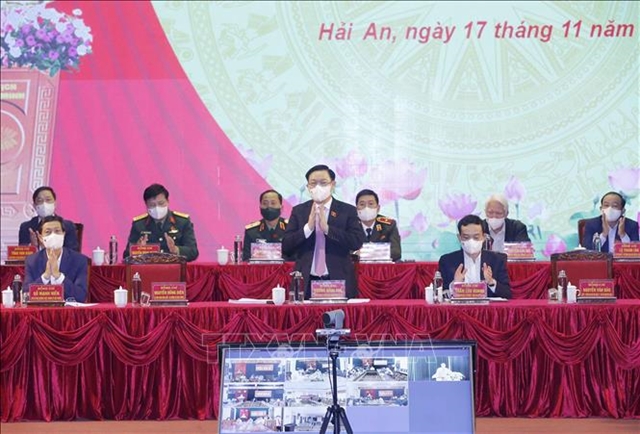 Politics & Law
Politics & Law

Voters in Hải An District, the northern city of Hải Phòng on Wednesday applauded the newly-issued resolution of the National Assembly that offers special mechanisms and policies for the development of some specific cities and provinces including Hải Phòng.

|
| The NA chairman Vương Đình Huệ (standing) and other NA deputies met with voters in Hải An District on Wednesday morning. — VNA/VNS Photo Doãn Tấn |
HẢI PHÒNG — Voters in Hải An District, the northern city of Hải Phòng, on Wednesday applauded the newly-issued resolution of the National Assembly that offers special mechanisms and policies for the development of some specific cities and provinces including Hải Phòng.
The resolution will create favourable conditions for Hải Phòng City’s socio-economic development and make it a driving force for the development of the whole northern region.
NA chairman Vương Đình Huệ and other NA deputies met with voters in Hải An District on Wednesday morning.
Speaking at the meeting, Huệ said that the resolution on special mechanisms and policies for the development of Hải Phòng City was issued to concretise the resolutions and conclusions of the Politburo. On August 5, 2003, the Politburo issued Resolution No. 32-NQ/TW on the construction and development of Hải Phòng City during the national industrialisation and modernisation. On January 24, 2019, the Politburo issued Resolution 45/NQ/TW dated January 24, 2019, on the construction and development of Hải Phòng City to 2030, with a vision to 2045.
The NA chairman said there was a huge change from Resolution 32 to Resolution 45.
He said: “Resolution 32 considers Hải Phòng a growth pole in the Hà Nội-Quảng Ninh-Hải Phong development triangle. But Resolution 45 has put Hải Phòng in another dimension as it is considered the growth engine of the north region and the whole country.
"With the early modernisation and industrialisation of the city, the material and spiritual life of people here has been constantly improved to be on par with outstanding cities in Asia.”
At the meeting, voters spoke about COVID-19 prevention and control, particularly the need for improved communication to gain public trust and consensus, improve grassroots healthcare facilities and safe flexible resilience to the COVID-19 pandemic.
They also asked for more attention to inflation control, infrastructure development, particularly a new Hà Nội–Hải Phòng railway, a railway to Lạch Huyện Seaport, and Tân Vũ-Lạch Huyện Bridge.
Other voters spoke about the need for institutional improvement, administrative reforms, improved business investment climate and support to enterprises and workers, particularly in affordable housing for workers.
Huệ agreed with voters' recommendations on COVID-19 prevention and control.
He said that at the second session, the National Assembly asked the Government to summarise domestic and international experience and lessons, improve analysis and forecast capacity to expeditiously complete, promulgate and implement the national COVID-19 prevention and control strategy effectively, smoothly and in a unified manner.
In the overall strategy, there is a plan to distribute and use vaccines in general and for children, in particular, to soon return children to school. The strategy also includes investment in improving the capacity of the health system; consolidating, perfecting and developing the grassroots healthcare network and preventive medicine; developing a package of fiscal and monetary policies to support the Socio-Economic Development and Recovery Programme.
Huệ asked the People's Council and People's Committee of Hải Phòng City to record and deal with recommendations and proposals that the local authorities are responsible for.
The city's National Assembly delegation would summarise and report to the National Assembly or the Government on issues that are under their management.
On the issue of continuing to innovate the performance and improve the efficiency of the National Assembly, the NA chairman re-emphasised the idea of President Hồ Chí Minh's book "Modifying the working style", affirming that “the National Assembly and its agencies are continuing to make efforts to innovate and improve operational efficiency and effectiveness, ensuring that all decisions are made for the legitimate interests of people and businesses.”
The innovation of the NA's operation is carried out simultaneously in all three constitutional fields – legislative, supreme supervision and decision-making on important national issues.
The National Assembly Chairperson cited, for example, the volunteer work in the past was only reported at the National Assembly session twice a year, but now it is reported monthly at the meetings of the National Assembly Standing Committee. The participation of the Government Inspectorate, internal affairs agencies, created a very positive change in citizen reception, complaints and denunciation settlement.
Regarding innovation at the latest NA session, Huệ said that the NA successfully conducted online meetings and divided deputies into groups for discussions.
At the second meeting of the 15th NA, deputies were divided into 72 groups, including 10 groups present in the National Assembly House, 62 groups in 62 provinces and cities – except Hà Nội.
When NA deputies discussed in groups in their locality, representatives from local departments and branches can attend and provide information to NA deputies. Therefore, voters and people said that the National Assembly was getting closer and closer to the people.
“Thanks to this improvement, the group discussions received so many opinions, during only eight group discussion sessions, 2,927 NA deputies gave their opinions,” Huệ said.
Regarding legislative work, the NA Chairman said that Politburo had issued Conclusion No. 19-KL/TW and oriented the law-making programme for the 15th National Assembly term, which clearly stated 137 tasks. Specific legislation needs to be implemented. Currently, many agencies have started implementing legislative tasks for the whole term.
In the supervision work, the National Assembly has just held a national conference to implement the supervision of the National Assembly and the National Assembly Standing Committee. The National Assembly and the National Assembly Standing Committee mobilised all 63 People's Councils and 63 National Assembly delegations of provinces and centrally-run cities to participate in monitoring delegations. Supervision not only focuses on law enforcement but also on the promulgation of detailed legal documents. — VNS




